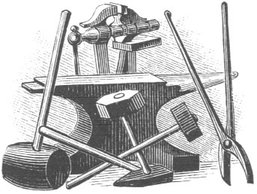
I've been having trouble getting the tech side of things down. Perfecting the tools and equipment my worlds use. So, instead of pridefully marching on, I asked an accomplished fantasy author, and dear friend, for any tips she might have on how to guide my research. This was the response.
“I suggest you start with something light but thoughtful: Diana Wynne Jone's book The Tough Guide to Fantasy Land. It's set up like a travel book and, if you read between the lines, includes a lot of information on the mistakes people make.
Just remember. Every single item you have implies an industry behind it. Even something as simple as a clay pot tells you something about geology, ecology, cultural needs etc. A sword implies not only a source of iron, but the knowledge of how to work iron, the materials to burn to get a hot enough fire etc.
Hope this gets you thinking.”
Get me thinking? I had a map of flight plans that would overwhelm LAX! I never thought about it from that angle, but it makes total sense. If they know how to make high end and/or highly complex metal works, they must be quite advanced in that field. Heck, just their underwear could speak volumes about the world. Think about that. You’re unmentionables are an indication of the world you live in?
Okay, be honest, how many of you just went looking into your underwear drawer, or down at your waist, thinking about what you’re wearing at the moment. Now now, don’t be shy. I did too. It’s incredible, yet so true. Every little thing is an indication of the world.
That’s what helps a world live. I've talked before about making a world real, but never about exactly how to pull it off before. Oh there's plenty to worry about. Culture, characters, places, events, politics, but it's the little things that matter. The tricorder in Star Trek. They needed the tech and materials to make it work, which affects all the technology they use. "Sting" from the Lord of the Rings books. It still had to be crafted, and infused with whatever magic makes it glow. Even the saddle the king's army of whatever uses. How it's made speaks to how good... or bad, their crafting is. They had to know how to make these things, and make them do what they do.
Magic isn't an excuse either. They still had to know how to do it. You can't just go off and say, "oh with the proper spell they can bend metal to their will". No. Magneto from X-men still has to know metal CAN do whatever he wants it to before he can make it do it.
Okay, it's going to mean a lot of effort. The moment someone pulls out a compass, you have a whole slew of science you have to ask if your world knows. You'd be surprised how much that simplest of devices could affect your world. Just how much do they understand about why it works? What else could they do with that knowledge?
Yeah, it's a lot of work. But then at the same time, it gives you more options too. Perhaps your main character invented the compass, and is able to use what he knows somewhere else to surprise the bad guys. You see how that works? Every detail matters. Every piece gives you insight into what can or cannot be done. You gotta define the box before you can think out side of it.
Just don't forget those undies! There's nothing worse than wet stuff trickling down your hero's leg during his climatic sword battle with the big bad leader dude in black armor.
Wait! What kind of armor? What weapons? You sure they know how to make all of it? What else could they make with that level of technology? Does it give your hero an advantage somehow?
*Hands out aspirin* You're welcome.
 RSS Feed
RSS Feed
